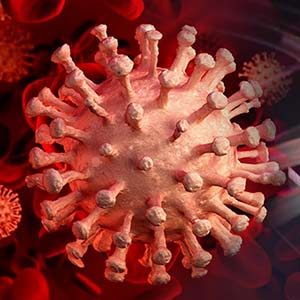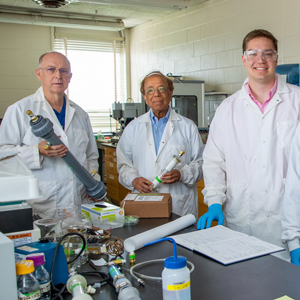In the search for effective COVID-19 treatments, a ray of hope has appeared. A synthetic glucocorticoid called dexamethasone, used for decades to treat conditions ranging from arthritis to immune system disorders, may hold promise for critically ill patients, according to an NIEHS scientist and his academic collaborator. Glucocorticoids are hormones that occur naturally in the body. They help to reduce inflammation and regulate stress, among other biological roles.
 “Glucocorticoids are part of the environmental stress system,” said Cidlowski. “So, if you’re stressed either mentally or by high temperature or smog, for example, that’s going to influence the way they function.” (Photo courtesy of Steve McCaw)
“Glucocorticoids are part of the environmental stress system,” said Cidlowski. “So, if you’re stressed either mentally or by high temperature or smog, for example, that’s going to influence the way they function.” (Photo courtesy of Steve McCaw)“Not only does dexamethasone reduce COVID-19-related mortality, but it is cheap, widely available, and comes with 60 years of safety profiling — bright news in a dreary season of world events,” write John Cidlowski, Ph.D., head of the NIEHS Signal Transduction Laboratory, and Derek Cain, Ph.D., assistant professor in medicine at Duke University, in a commentary published August 10 in Nature Reviews Immunology.
Fighting hyperinflammation
The authors, both experts on glucocorticoids, analyzed the recent Randomized Evaluation of COVID-19 Therapy (RECOVERY) clinical trial, which included thousands of patients in the United Kingdom. Dexamethasone suppressed a dangerous hyperinflammatory response that can arise in later stages of the disease and cause severe respiratory distress, sepsis, and organ failure.
For patients on ventilation and those on oxygen support with no ventilation, death rates dropped by one-third and one-fifth, respectively. Individuals not receiving such breathing assistance saw no benefits, likely reflecting that they were in a less advanced stage of the disease. Glucocorticoids suppress immune activity, making them more beneficial for patients experiencing hyperinflammation, according to the authors.
A two-phased disease
“I think the medical community is beginning to appreciate that COVID-19 is really a two-phased disease,” said Cain, a former NIEHS postdoctoral fellow who trained under Cidlowski, in an Environmental Factor interview. “Early on, the virus drives the pathology, with symptoms such as loss of sense of smell. Then there are symptoms that indicate an immune response, such as fever and muscle aches. Most people get through that and fend off the virus,” he explained.
 “I’m an immunologist by training, and I joined John’s lab as a postdoctoral fellow because he had developed a mouse strain in which a certain immune cell type was not responsive to glucocorticoids,” said Cain. (Photo courtesy of Derek Cain)
“I’m an immunologist by training, and I joined John’s lab as a postdoctoral fellow because he had developed a mouse strain in which a certain immune cell type was not responsive to glucocorticoids,” said Cain. (Photo courtesy of Derek Cain)“But in other patients, something happens that we don’t fully understand yet,” Cain said.
“The virus elicits a hyperinflammatory state, and suddenly, the immune response is out of control,” he noted. “This is what John and I call a feedforward loop, where powerful immune cells called neutrophils enter the lungs to fight the virus but end up causing more damage. That process sort of builds on itself and makes the patient’s condition worse.”
Dexamethasone may help patients by stopping that feedforward loop and their aggressive immune response, the authors suggest.
Dose matters
A key takeaway from the RECOVERY trial is that patients received low doses of dexamethasone, thereby avoiding severe side effects seen at higher amounts, such as hypertension, according to Cidlowski, who spoke with Environmental Factor. Low doses also help patients avoid glucocorticoid resistance, which would make the drug ineffective.
“Long-term treatment with glucocorticoids, unless monitored and kept to a very low dose, is not without its problems,” he noted.
Reducing side effects
“We’re now working on trying to understand how we can dial away side effects,” said Cidlowski, referring to his lab at NIEHS. “If you had a glucocorticoid that didn’t produce side effects but was anti-inflammatory, it could be used at 10 times the rate of today because you could use it in older people, in women who are postmenopausal, and others,” he said.
Cidlowski joined NIEHS in 1995 and is a leading expert on glucocorticoids, but he says much work remains on the subject. “Not a week goes by when we don’t discover something new about what they’re doing or how they’re doing it,” he noted.
“Glucocorticoids are essential for maintaining viability in humans, mice, fish, and other animals,” Cidlowski said. “We work almost exclusively in animal models of disease, trying to elucidate what glucocorticoids are doing in different tissues. We work on the brain, the lungs, the liver, the heart, and the intestine because every tissue in our body has glucocorticoid receptors.”
Citation: Cain DW, Cidlowski JA. 2020. After 62 years of regulating immunity, dexamethasone meets COVID-19. Nat Rev Immunol; doi.org/10.1038/s41577-020-00421-x [Online 10 August 2020].
(Jesse Saffron, J.D., is a technical writer-editor in the NIEHS Office of Communications and Public Liaison.)









